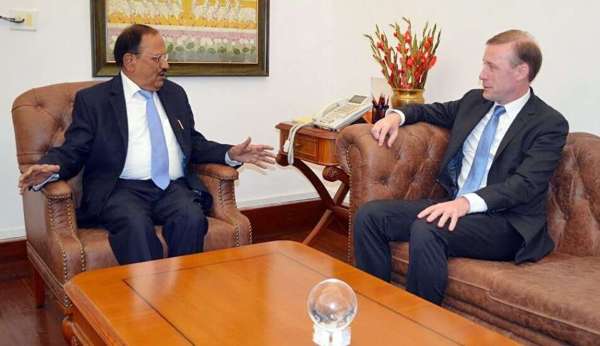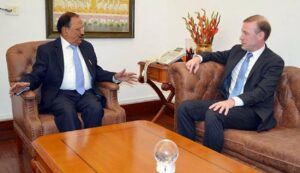
On Monday, US counterpart Jake Sullivan met with National Security Advisor Ajit Doval in New Delhi. In order to foster civil nuclear cooperation, Sullivan discussed the US’s attempts to complete the procedures required to delist Indian nuclear enterprises.

The US NSA According to a Ministry of External Affairs (MEA) news statement, Sullivan gave the Indian side an update on the Biden administration’s revisions to US missile export control regulations under the Missile Technology Control Regime (MTCR), which would strengthen US commercial space collaboration with India.
In a press release, MEA stated, “Reflecting the progress the United States and India have made–and will continue to make–as strategic partners and countries with a shared commitment to peaceful nuclear cooperation, NSA Sullivan announced US efforts to finalize necessary steps to delist Indian nuclear entities, which will promote civil nuclear cooperation and resilient clean energy supply chains.”
A group of high-ranking US government officials joined NSA Sullivan for the meeting. Through in-depth conversations on a wide range of bilateral, regional, and international issues, Doval and Sullivan have consistently maintained a high-level engagement.
NSA Doval and NSA Sullivan have spearheaded tangible initiatives between the two nations in a number of areas, including artificial intelligence, quantum computing, semiconductors, telecommunications, defense, and space, since Prime Minister Modi and US President Joe Biden announced the India-US Initiative on Critical and Emerging Technologies (iCET) on the sidelines of the Quad Summit in Tokyo on May 24, 2022.
“The current visit gave them the opportunity to review ongoing progress in their high-level dialogue, including in diverse fields such as Defence, Cyber and Maritime Security,” MEA said in a news statement.
Sullivan also visited IIT Delhi on Monday, where he saw Ajit Doval’s efforts to advance US-India collaborations on a number of initiatives.
“I would like to recognize my counterpart, the National Indian National Security Advisor Ajit Doval, because it was partly his vision,” Sullivan said during his Monday speech at IIT Delhi. In order to move our two nations ahead, further our respective interests, uphold our respective values, and create a better world for everyone, that technology—especially the most cutting-edge technologies of the future—would be a catalyst for the US-India relationship.
“And through this partnership, through this initiative, and through so many other things that Ajit and I have had to deal with over the course of the past 4 years, he and I have developed a deep personal relationship, a deep professional relationship, and it is that relationship in part I believe that has helped play such a critical role in ensuring that the US-India partnership has reached a new high level,” he said.
Sullivan outlined new areas, such as biotechnology and artificial intelligence, where the US and India might work together. He said, “Now the fundamental premise of I said is that in an era of renewed geopolitical competition, the US and India have to collaborate on the development, diffusion and protection of critical technologies from artificial intelligence to biotechnology and beyond.”
India’s contribution to the development of vaccinations during the epidemic was valued by the US NSA, which also had plans to send an astronaut into space with them.
“We’ve worked together over the last four years to help stop the epidemic and introduce vaccinations to the globe. We’ve started projects on sustainable energy, jet engines, and semiconductors, and in a few months we’ll work together to send an Indian astronaut into space. Utilizing the extraordinary inventiveness of the American and Indian people, we were able to accomplish these outstanding accomplishments,” he said.